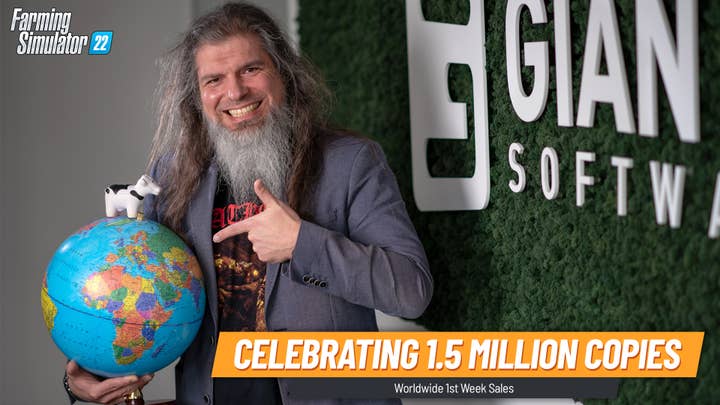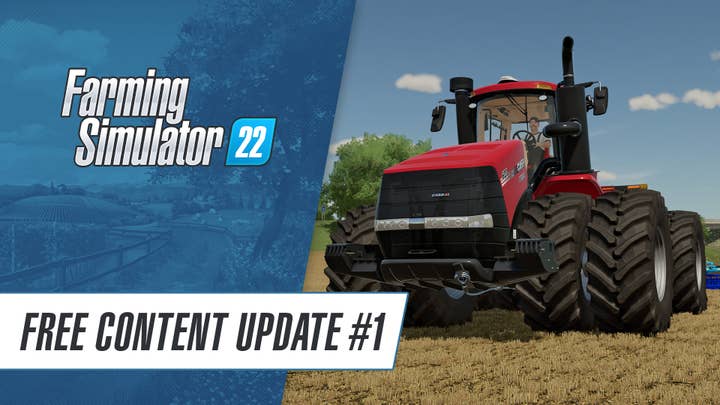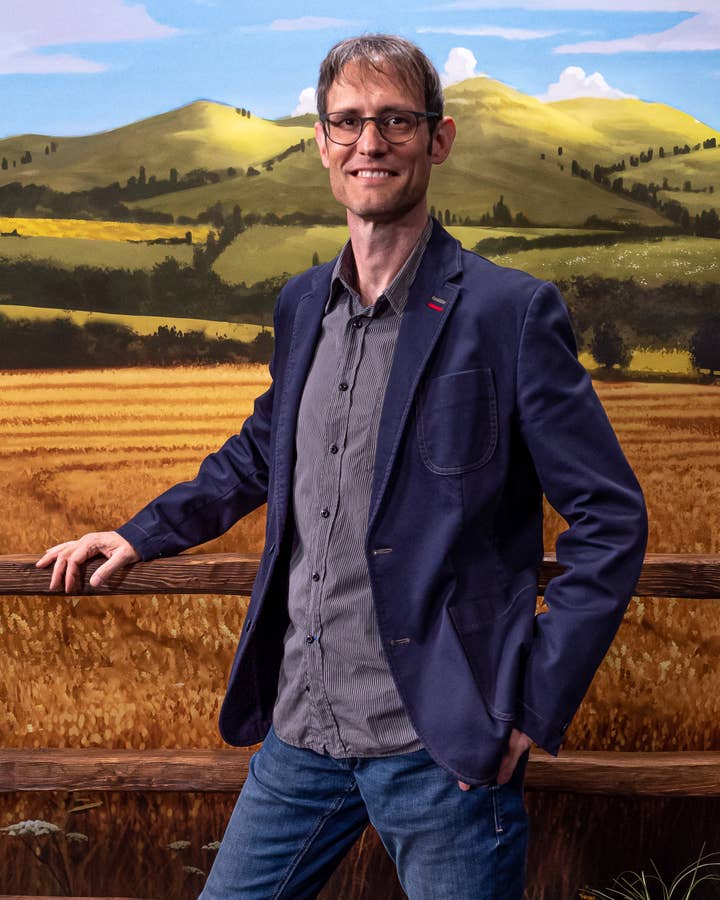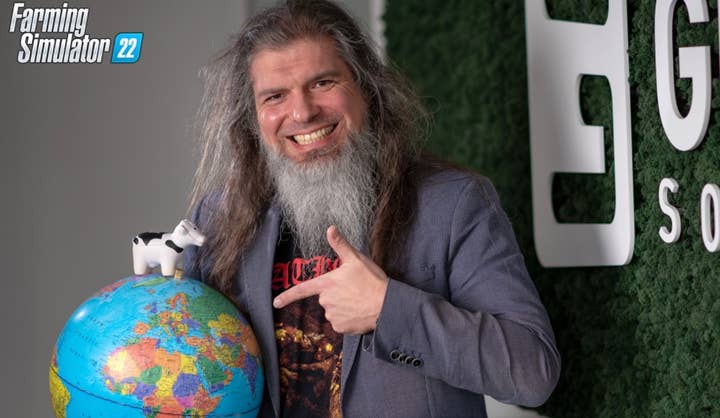How GIANTS Software embraced self-publishing for the record-breaking launch of Farming Simulator 22
Inside the five-year self-publishing journey of the Farming Simulator creators
An ambitious newcomer, coming to grips with the realities of running their own operation and learning as they go. The cinematic for GIANTS Software's latest entry in the Farming Simulator series depicts the journey of a new farmer, but could easily tell the story of its creators taking on self-publishing during a global pandemic. While this approach would reap record-breaking benefits for the release of Farming Simulator 22 in November, GIANTS Software's road to self-publishing began in 2016, when it started building up its internal departments.
"Our main goal was having, centralised within GIANTS, all the different efforts for the game: marketing, PR, development -- which was already in our hands -- but also publishing and distribution," head of publishing Boris Stefan explains.
Before joining GIANTS Software early 2020, Stefan was responsible for 17 countries as head of digital business in Central Europe for a well-known Japanese publisher. However, his role at GIANTS would be a more global endeavour. "It's not only establishing the distribution network: it's also establishing how we want the distributors to work for us," he says. "I was aware of that, but I also knew that this could be a hard piece of work."

"When Boris joined, I spent some time talking with him, trying to figure out what we need internally in terms of people, and what departments might expect us to deliver," head of marketing and PR Martin Rabl says.
The onset of COVID-19 forced the studio to adopt a digital strategy for Farming Simulator 22, focusing on video content and giving out preview copies alongside small on-site events, whilst ensuring developers could work safely at home and in the office. "The most challenging thing was building up a distribution network all around the world without talking with the people face-to-face," Stefan says. "I had to learn to squeeze out the little things via video conferences."
These efforts included establishing an ambassador programme, where community representatives in non-English speaking regions gave feedback to GIANTS about the game. "Usually they are people that already know the game quite well - some of them are influencers themselves. That helps us a lot to get in touch with more people than we could with just our forums or our own social media activities," Rabl explains.
"That corresponds directly with our [regional] distributors," Stefan adds, giving GIANTS further local market coverage. "That, in combination with the feedback of our influencers, gives us a better view."

For GIANTS, reaching fans in new markets was an important aspect of its self-publishing efforts, a challenge aided by the introduction of cross play across console, PC and Stadia versions of Farming Simulator 22, something Stefan points to as a crucial innovation for the series. "[Crossplay] really helps drive more people into the game as they are now able to play with their friends all over the world," he explains. "It really helps."
However, stepping into the shoes of former publishers Focus Entertainment brought with it a number of logistical challenges. "Suddenly, we had to produce way more assets than before," Rabl tells us. "Before, we produced some screenshots or a video and then we gave it to Focus and then they distributed it. Now, we had to create tons of variants of each video."
Take packshots. The basic template for Farming Simulator 22 depicts a tractor against a basic countryside background, displaying a real-world brand. GIANTS tailor these tractor brands according to different countries' tastes, producing four different packshot variations. When you factor in different languages, Stefan estimates that roughly 90 different versions of the game's bill of materials were produced for manufacturing. Despite this, Stefan feels that publishing physical copies of Farming Simulator is important for marketing and product visibility.

"I really believe that only a physical product in the shelves of a retailer gives a digital product the gravity which it needs to become a big game," he says. "Without a physical release, it's somehow not there."
Farming Simulator 22 marked a departure from the series' previous biennial release schedule for mainline instalments, being created over a three-year period. "This three-year gap was intended to have more time for development, to build up all the publishing efforts," PR and marketing manager Wolfgang Ebert says, noting that the pandemic did not delay the game's release. "It was also following our community's wish. Our product is very heavily into mods and with a new product, all the mods have to start from scratch again. Therefore, our modders are really pleased [with] a longer lifetime for our product."
And the effort paid off. Farming Simulator 22 sold 1.5 million copies just one week after releasing in November, which is a series record. By comparison, the prior mainline entry sold one million copies within 10 days of launch. Quite the achievement, albeit one made tricky to fully appreciate with pandemic restrictions as GIANTS Software had to cancel several launch events.
For GIANTS, its in-house expertise was invaluable. Around one-third of staffers come directly from the Farming Simulator community, which covers everything from competitive gamers taking part in Farming Simulator League World Championships to YouTubers and modders.

"We were super flexible, reviewing everything in-house and planning it from the beginning with the expertise of our developers, QA people, customer support - lots of people that know farming so well. That really helped when creating trailers and assets," Rabl says. "It gave us a bit more time, and every day counts when you create a trailer and you want to make it perfect."
This is perhaps best showcased by the aforementioned cinematic trailer, which gently pokes fun at newcomers whilst speaking reverentially about the profession's cultural heritage. "With our marketing efforts, we want to attract not only our fans, but we want to open up the game to new virtual farmers," Stefan explains.
Going forward, GIANTS sees the market for simulation games continuing to evolve and grow. Farming Simulator attracts a wide, primarily male audience ranging from young children up to senior citizens: Ebert draws a comparison to football fan demographics. However, the studio hopes to expand its player community. "It would be so nice to see our community being more diversified, having more women playing our game," Stefan says. "I would love to see that, but at the moment I do not know."
Having established itself as publishing partners with various platform holders like Microsoft and Sony, GIANTS is considering publishing third-party games in the future, branching out from farming games and -- potentially -- the simulation genre.
"We are open for developers proposing us games to be published by us," Stefan says. "Maybe at some point we [will] find one."
